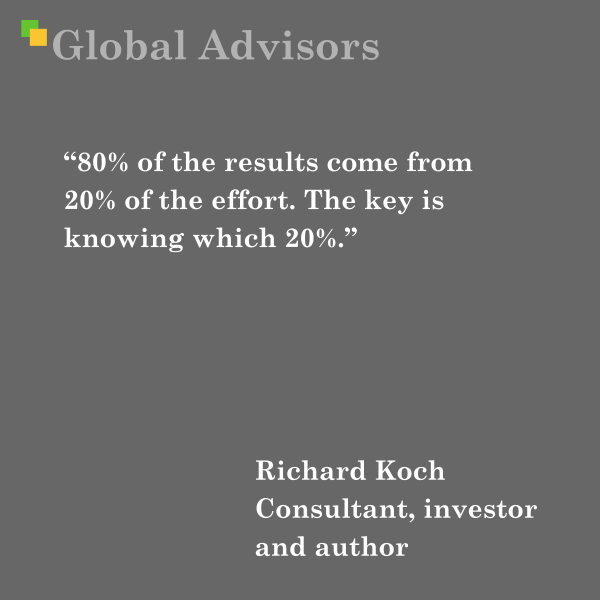“80% of the results come from 20% of the effort. The key is knowing which 20%.” – Richard Koch – Consultant, investor and author
This quote summarises the essence of the 80/20 Principle, a core concept in business strategy and personal effectiveness that has revolutionised how individuals and organisations approach efficiency and results. The insight traces its roots to the Pareto Principle, originally observed by Italian economist Vilfredo Pareto in the late 19th century, who noticed that 80% of Italy’s land was owned by 20% of its population. Richard Koch, a British management consultant, entrepreneur, and renowned author, reinterpreted and greatly expanded this principle, framing it as a universal law underpinning the distribution of effort and reward in almost every domain.
In his bestselling book The 80/20 Principle, Koch shows that a small minority of actions, resources, or inputs nearly always yield the vast majority of desirable outcomes—whether profit, value, or progress. Koch’s central insight, as expressed in this quote, is the competitive advantage gained not simply from working harder, but from consistently identifying and focusing on the few efforts that drive the greatest impact. For leaders, strategists, and achievers alike, the practical challenge is “knowing which 20%,” requiring careful analysis, experimentation, and a willingness to question assumptions about where value is truly created.
In his career, Koch has demonstrated the application of his principles through venture capital investments and business advisory, targeting the vital few opportunities with outsized potential and helping businesses focus on their most profitable products, customers, or ideas. This philosophy is deeply relevant in an age of information overload and resource constraints, offering a way to cut through complexity and direct energy for maximum effect.
About Richard Koch
Born in London in 1950, Richard John Koch is a British management consultant, business investor, and prolific author whose work has had a global influence on management and strategy thinking. Educated at Wadham College, Oxford (M.A.) and The Wharton School of the University of Pennsylvania (MBA), Koch began his career at the Boston Consulting Group before becoming a partner at Bain & Company. In 1983, he co-founded L.E.K. Consulting.
Koch’s investment career is as notable as his advisory work; he has backed and helped grow companies such as Filofax, Plymouth Gin, Betfair, and FanDuel. His hallmark book, The 80/20 Principle, published in 1997 and substantially updated since, has sold over a million copies worldwide, been translated into dozens of languages, and is recognised as a business classic. Beyond The 80/20 Principle, Koch has authored or co-authored more than 19 books on management, value creation, and lifestyle efficiency.
Koch’s legacy is rooted in translating an elegant statistical reality into an actionable mindset for business leaders, entrepreneurs, and individuals seeking to achieve more by doing less—focusing always on the “vital few” over the “trivial many”.
Leading Theorists Related to the Subject Matter
Vilfredo Pareto
The intellectual foundation for the 80/20 Principle originates with Vilfredo Pareto (1848–1923), an Italian economist and sociologist. Pareto’s original observation of uneven distribution patterns—first in wealth and later in broader social and natural phenomena—gave rise to what became known as the Pareto Principle or Pareto Law. His insights provided the mathematical and empirical groundwork for the efficiency-focused approaches that Koch and others would later popularise.
Joseph M. Juran
Building on Pareto, Joseph M. Juran (1904–2008) was a pioneering quality management theorist who championed the 80/20 Principle in operational and quality improvement contexts. He coined the terms “vital few and trivial many,” urging managers to focus quality-improvement efforts on the small subset of causes generating most defects—a direct precursor to Koch’s broader strategic applications.
Peter F. Drucker
Peter F. Drucker (1909–2005), known as the father of modern management, extended related themes throughout his career, emphasising the necessity of concentrating on the few activities that contribute most to organisational and individual performance. Drucker’s advocacy for focus, effectiveness, and the elimination of low-value work dovetails with the spirit of the 80/20 Principle, even if he did not formalise it as such.
Richard Koch’s quote is a reminder—backed by deep analytical rigour and hard-won experience—that efficiency is not just about working harder or faster, but about systematically uncovering and amplifying the small fraction of efforts, decisions, and resources that will yield extraordinary returns.


